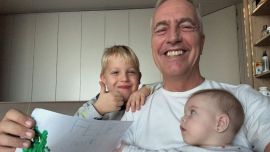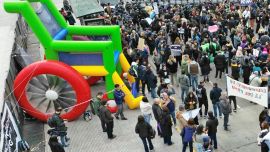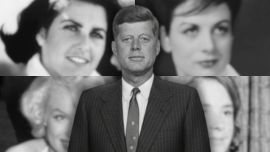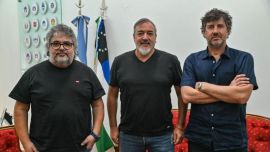Jorge Lanata was immersed in journalism from a very young age and his career took him to many of the country’s leading newsrooms, including some which no longer exist. A large presence on both television and radio, he founded and directed media such as the Página/12 daily, although as the years went by, he departed from the newspaper’s ideological line.
In the last decade Lanata toughened his anti-Kirchnerite profile with his Periodismo Para Todos (PPT) programme. He was the protagonist of a period when his word was central to national political debate. Meanwhile, he wrote books, directed documentaries and other multi-platform projects while attracting readers with his weekly Saturday columns in the newspaper Clarín.
Born on September 12, 1960 in Mar del Plata, Lanata pioneered the transformation of the forms of narrating reality, combining acumen, irony and a critical focus which converted him into an outstanding journalist and, at the same time, polarised the country.
Lanata did not limit himself to the print media – he shone in radio, television and literature. His radio programme Lanata sin filtro, transmitted by Radio Mitre, drew the biggest audiences with thousands following his analyses and commentaries. On television he ran some of the most memorable programmes of Argentine journalism, like Día D and, more recently, Periodismo Para Todos, a series which marked the media and political agenda of the country as from 2012.
Furthermore, Lanata moved further afield into documentary production, theatre and literature with works like Argentinos, Cortinas de Humo, 10K: La década robada and other titles exploring the identity and defects of the country.
Throughout his career, Lanata received multiple prizes which boosted his media impact, among them 26 Martín Fierros (including the Golden), as well as the Tato, Konex and ACE Prizes. He was also nominated for an International Emmy for his investigative journalism in La ruta del dinero K, which revealed a massive scheme of high-profile corruption.
His direct style and ideological stances triggered both admiration and rejection. His constant confrontation with the political and economic powers that be won him both loyal followers and implacable critics, consolidating him as a central figure in the Argentine public arena.
At a personal level, Lanata had a life marked by intense relationships and difficult moments. The father of Bárbara and Lola, born of different marriages, his last years were shared with Elba Marcovecchio, his partner since 2020.
In 2016, Lanata faced a wrenching moment when he discovered at the age of 55 that he had been adopted after the confession of a cousin. This discovery, which took time to sink in, strengthened his link with his adoptive parents, María Angélica Álvarez and Ernesto Lanata, who brought him up in a humble home in Sarandí.
His health also presented important challenges. Throughout his life, Lanata faced chronic illnesses which obliged him to submit to various treatments and spells in hospital although he always returned to work with renewed determination.
Lanata was a protagonist of an unprecedented health and human milestone in 2015 when he participated in the first cross kidney transplant in Latin America when his then-partner Stewart Brown. who donated one of her kidneys to a young patient whose mum gave her kidney to Lanata.
"We were the first case of a cross transplant in Latin America. There was this woman of 50 with a son of 20 and Sara Stewart Brown and me. Sara was more compatible with the son than with the mother," Lanata later said, adding: "She gave a kidney to the son and I was compatible with the mother, who gave her kidney to me. One Saturday they opened up four operating theatres. What happened afterwards? Look, if you take care of yourself, you can continue living normally."
Early years
Born in Mar del Plata, Jorge Ernesto Lanata would spend his earliest years in Sarandí, Avellaneda district, growing up in a lower middle-class family with adopted parents, a detail of which he only became aware of at the age of 55.
His education and upbringing would be shared by his aunt and grandmother from the age of seven, after his mother became completely paralysed, following an operation for brain cancer. At that young age journalism was already in his head, heart and hands.
Aside from his intellectual and personal education, his primary and secondary schooling had their journalistic aspects, beginning with a paper round of Colmena, a newspaper of the San Martín secondary school, forming part of the newspaper Ciudad de Avellaneda.
In 1974, when aged only 14, he would penetrate the world of journalism yet further when he was assigned the task of editing cables for Radio Nacional 6. Yet despite his strong vocation, personal needs and Argentina’s socio-political situation temporarily diverted him from relaying information.
During the military dictatorship (1976-1983), he worked as a waiter in a bar. The uncertainty would only last a short time for Lanata who in 1977 would again be employed as a journalist for the magazine Siete Días. That year he entered the Cooperativa de Periodistas Independientes, which edited the magazine El Porteño, an iconic publication of the 1980s founded and created by Gabriel Levinas and Miguel Briante. He served as editor-in-chief.
During the democratic transition of 1983, he worked at Radio Belgrano where he was in charge of the investigative journalism for the programme Sin anestesia, hosted by Eduardo Aliverti.
Three years later he would enter into his first romantic relationship with Andrea Rodríguez, with whom he also had his first daughter, Bárbara.
Página/12 and much more
In May, 1987, at the age of 26, he founded the centre-left newspaper Página/12, heading its newsroom for its first seven years. In August, 1990, at the same time he married Silvina Chediek, he started to publish the monthly magazine Página/30, which he directed until April 1995.
He would return to radio after joining Rock & Pop with the programmes Hora 25 and RompeCabezas. In 1998, he founded the magazine Veintiuno, where he brought together such former members of the Página/12 newsroom as Ernesto Tenembaum, Marcelo Zlotogwiazda, Martín Caparrós, Andrea Rodríguez and Adrián Paenza, among others.
During that year, he formalised his penultimate romantic relationship with Sara Stewart Brown, the mother of his second daughter Lola. Lanata quit as Página/12’s editor in late 2001, selling most of the shares to the owners of TV Guía and proceeding to found the magazine EGO.
After a short period covering a noon programme for Uruguay’s Radio Colonia with low ratings, he returned here in 2005 with Lanata AM for Radio del Plata. Until late 2007, he headed Lanata PM for the same AM 1030 station, together with Maximiliano Montenegro, Reynaldo Sietecase, Norberto El Ruso Verea, Verónica Castañares and Romina Manguel, among other columns.
He also wrote an opinion column for Perfil newspaper. In 2008 he launched his creation Crítica de la Argentina. Despite considerable success, he left the post of director due to differences with the businessman and majority shareholder Antonio Mata.
Move to mainstream
From April 2009 until 2011, Lanata headed the journalistic programme DDR for Canal 26 television channel. During that period, notably in 2010, he produced and headed documentaries for CNN (Cable News Network).
In 2011, he also had a brief televisual experience in Uruguay with Teledoce but his programme was lifted, according to the channel, "for purely economic reasons," causing concern among Uruguayan journalists. In 2012 he collaborated with the Latin American chat show La Ventana, a programme led by Gemma Nierga in Spain’s Cadena SER radio station.
That same year he began his iconic Radio Mitre programme Lanata sin filtro, taking to the airwaves every weekday between 10am and 2pm, transmitting later in streaming format by video online.
On April 15, 2012 he began his famed Canal 13 television programme Periodismo para todos (PPT), starring every Sunday at 10pm in a show that regularly made headlines elsewhere for its take on events, investigations and allegations.
Entering its second season on April 14, 2013, PPT topped all TV ratings, leading the political agenda for all other media, written or broadcast, which often spent the following week expanding on the issues raised by him, even drawing a government response. This converted Lanata into a mega-star of show business. The programme continued until 2020.
In 2019, he had an interview programme called Hora 25. He would finally proceed to install himself on the screen of Todo Noticias (TN) television news channel with a daily column.
Lanata and Javier Milei
Last year, Lanata reverted to being an opposition journalist, despite having been highly critical of the previous government.
"The country of which Milei dreams is a country capable of 80 percent poverty,” he warned in an interview with Nelson Castro in TN’s El Corresponsal programme last June.
In an April interview with Perfil's Jorge Fontevecchia he analysed with concern the presidential profile, evaluating: "Today the Milei we are talking about is the Milei who is one of Time magazine’s 100 leading personalities of the year, not a frustrated Milei, a Milei who just met up with the creator of Tesla [Elon Musk]. He’s in a good mood, the world smiles on him, etc.
“What would an annoyed Milei be like? So this is a normal Milei. He has passed from being a panellist to president in a very short period of time and I believe that even now he is not aware of being president. It’s like when you’re in a classroom and the teacher yells, it’s because he has no authority."
"Milei not only yells because he does two things, one is to yell and the other is to accuse, which are two very different things because if Milei had said to me: 'You’re a bad journalist,' I’d have just had to put up with it. But if he says to me: 'You’re ensobrado [“on the take”],' that’s another issue because if I do not sue him, I’m accepting that I am," was how Lanata summarised a judicial confrontation between the two.
"I think that the Milei vote was completely irrational with people saying: 'You know what? If we’re going to shit, let’s go all the way,'" he concluded in typically sharp style.
– TIMES/PERFIL/NA


























Comments